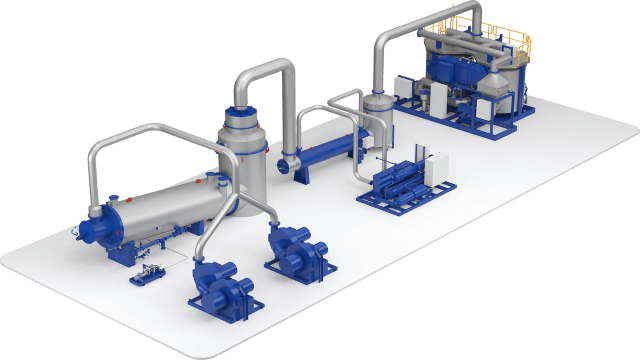Smit LNG
Alfa Laval Smit LNG/LPG is a dry inert gas generator with low pressure and low dew-point.
The most complex inert gas generators are installed on LNG carriers, where very dry inert gas is required. Smit dry inert gas generators from Alfa Laval, have integrated controls and consist of four main components: generator, cooler, chiller and dryer unit.
The cooler, which has gas contact surfaces of SUS 316 for lifetime service, takes up minimal space due to the low-temperature output of the generator. Using water from the chiller, it stabilizes the heat radiation in all conditions.
The dryer unit is redundant and provides additional security. The entire installation is horizontal and allows easy maintenance, although maintenance is seldom required.
Design data
- Capacity: 1,500-25,000 m³
- Design: Combustion + drying
- Pressure: 0.3-0.4 bar (g)
- Typical oxygen content: 0.5-1%
- Fuel type: DMX, DMA, DMB
- Fuel atomizing: Air/steam
- Dew point:Dry -45/-65°C
- Recommended for installation on: LNG tankers, LPG tankers, Other gas tankers, FPS
Applications
- LNG carriers
- LPG carriers
Sådan fungerer det
For gas- and chemical transportation the inert gas needs to be of high purity. For many applications, oxygen levels of 0.5% or even 0.1% are required, in combination with a water dew-point of about -45 °C and sometimes lower (-65 °C). Also here, the burner is the heart of the system as the inert gas needs to be absolutely soot free in the first place. This is achieved with the Ultramizing Combustion system.

When the gas leaves the generator, it has the right composition, but it is saturated with 100% water and has to be dried.
The drying process takes place in two steps. In the first step of the refrigerant cooler, the gas temperature is lowered to 5 °C which results in condensation of a great quantity of water.
In the second stage the inert gas is dehumidified further in a double vessel type drying unit using activated alumina or adsorbent. The whole process operates under a pressure of about 0.3 bar(g).
